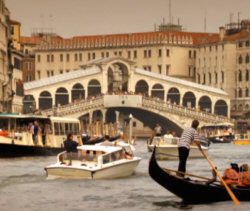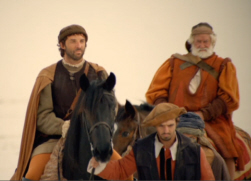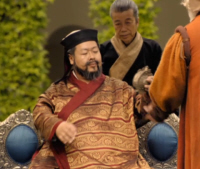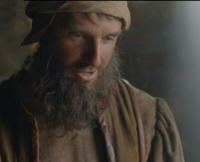Marco Polo - Venice Merchant

Flashy fabrics and pungent spices had travelled along the Silk Road to Europe from ancient times, but the lands they came from - China, indeed all of the Far East - remained a mystery in the West. After the victories of Genghis Khan, the Silk Road was opened to outsiders. And soon, it would set the imagination of Europe aflame. Genoa, 1298. Two political prisoners share a prison cell. One man is Rustichello of Pisa, a writer of popular tales. The other… is a gabby Venetian with a fabulous story to tell. And in Rustichello, Marco Polo had found his perfect ghost writer.
Marco Polo was a new and adventurous kind of European merchant. And Venice was becoming the essential hub for trade between Europe and the rest of the world.
Its prosperity was built on ruthless commercial attitudes and a navy mass-produced at its world-famous shipyard, the Arsenale. But the Venetians were less interested in conquering than doing deals. And in a world that craved foreign tastes, you got the best deals by looking east.

The Venetian fleets were tightly tied into a huge trade network dominated by the Muslim world, and dealing not just in slaves but in timber, fur, salt and the incredibly valuable spices. The young Marco Polo’s world was already flavoured and scented with cinnamon, nutmeg and cloves and pepper. This was literally the smell and taste of the East. And he dreamed from an early age of following the ancient Silk Road which led to China.
In 1271, aged just 17, he was offered a once-in-a-lifetime opportunity with his father and his uncle. He set out east from Venice, bearing greetings from the most powerful man in Western Europe, Pope Gregory X. Most Europeans barely moved more than a few miles from their birthplace. Heading out so far into the unknown must have felt like a launching yourself At the moon.

Destination Xanadu

The trek took them more than three years through the deserts and the mountains of Asia. Finally, in 1275, they reached their destination. The court of Kublai Khan in Shangdu, better known as Xanadu.
Xanadu seemed an earthly paradise. Kublai Khan was entranced by the civilisation he now ruled. He was a Mongol becoming Chinese. His court celebrated the flow of ideas. This was a land of safe roads, broad canals and manufactured goods. Still, he was fascinated by his visitors from Italy and their message from the Pope. He briefly considered turning Christian himself… briefly.
Pleased with their tales of distant lands, he invited them to be part of his inner circle of diplomats and advisers. Marco Polo told Rustichello he travelled to distant corners of China on diplomatic missions for his patron. Later, he’d tell of astonishing things never seen in Europe, such as money made of paper, the burning of pieces of black stone for fuel, and the practice of eating snakes and dogs.

Though other things you’d think he’d notice, such as chopsticks or the Great Wall of China, were missing from his tales when he finally got home.
Around some men, stories gather like flies. It was said that when Marco Polo returned to Venice after 24 years travelling in China and the Far East, dressed in greasy furs and filthy silks, he simply slit open the seams of his clothes, and a cascade of rubies and emeralds poured out. It’s a good story, but take it with a pinch of salt, because even in his lifetime, Marco Polo was known as Marco Il Milione - Marco Millions. Not because of his wealth but because of his exaggerations. Millions of this, millions of miles, millions of that.
At this point, Marco Polo might have disappeared from the pages of history. Instead, he dictated himself into them. During their imprisonment, Rustichello of Pisa noted down his cellmate’s stories. And in 1298, copies of the manuscript began circulating around Europe, as Marco Polo’s Description Of The World. And Europe was gripped.
Downside of Foreign Travel

Marco Polo’s message was simple and seductive. There was a fabulous world of wealth and opportunity beyond Europe. But as Europeans would soon learn, there was also a dark side to this new international network.
Seven years after Marco Polo’s death a strange epidemic in China started killing people in huge numbers. Very soon, the Black Death, carried on ships, probably by rats, spread into the Mediterranean region and then beyond. This same exchange of goods and people that have made Venice so rich was now taking a terrible revenge. Across Europe, bustling markets became ghost towns, villages emptied, literacy retreated, authority tottered.
Marco Polo had issued a great, optimistic rallying call, but Europe was simply too weak to respond.
